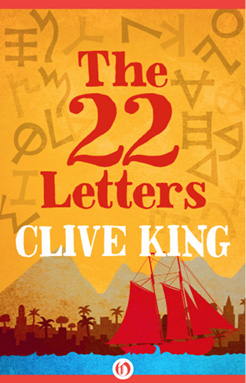Authors: Richard; Clive; Kennedy King
The 22 Letters (26 page)
“My message?” said Aleph in bewilderment. “You mean the bird â¦? It came back, and you understood?”
Zayin spoke as though something had just struck him. “If that bird had not told us about Pharaoh's army, the Egyptians would have captured the cityâ”
“Before the destruction came,” put in Nun. “And they would not have let us take to the mountains andâ”
“And we would not be here now,” finished Beth quietly.
“Tell me what happened,” said Aleph. “They sent me from Sinai, northward with a supply column. There was darkness and confusion, and I escapedâ”
“We shall have plenty of time to tell our stories,” said Beth. “Now you must eat.”
Aleph took the wine and the water-gruel. “I am sorry to be just another mouth to feed,” he said.
“Nonsense, my boy,” said his father. Resh turned to the others, “Aleph is now the only scribe in Gebal.”
His father spoke, proudly, but Aleph felt all his shame returning. He turned his head away. “You know I never learned all the six hundred and four signs, Father. Now there is no one to teach me. I am no use to anyone.”
“Aleph,” Beth said. “You have your twenty-two letters. They seem to be enough. One day all our story will be written with them.”


A Final Word
Historians do not know how the alphabet was invented, what ship was first navigated by the stars, or who introduced mounted cavalry. So the names of people in this story are not historical: Aleph, Beth, Nun, Zayin, and Resh are taken from the names of letters in the first alphabet. The first two, of course, are contained in this word. The name of King Abishram was formed by combining the names of two known kings of Gebal, Abishmu and Ahiram.
We do know, however, that the prophecies put into the mouth of the Chaldean came true. Gebal, or Byblos, became one of the cities of the Phoenician nation, whose merchant fleets traded all over the Mediterranean and reached as far as Britain and perhaps much farther. Armies based on the Phoenician colony of Carthage threatened Rome. Dido, Queen of Carthage, was one of the first great queens of history and legend. And the simple alphabet of twenty-two letters, which as far as we know was invented and developed in Gebal-Byblos, was the basis of all writing systems used in the modern world, except the Chinese.
If you go to the island of Thira, just north of Crete, you will find a great crater filled by the sea and used as an anchorage for ships. The eruption of the original volcano must have caused the greatest explosion that has yet taken place in civilized times. It is possibly because the results were so catastrophic that its history was never written.
Bebal is now a peaceful little town on the coast of modern Lebanon, where you may see excavations representing every period for the last ten thousand yearsâincluding the King's tomb in dark and white stone, an anchor offered in a Temple, the great walls and the huddled houses, and some of the twenty-two letters.
About the Author
Clive King was born in Richmond, Surrey, in 1924. In 1926, he moved with his parents to Oliver's Farm in Ash, Kent, on the North Downs, alongside which was an abandoned chalk pit. During his early education at a private infant school, one of the teachers, Miss Brodie, claimed to have taught Christopher Robin Milne (the inspiration for Winnie the Pooh's Christopher Robin), and introduced Clive to stories about Stone Age people. Thereafter, he attended King's School, Rochester; Downing College, Cambridge; and the School of Oriental and African Studies, London. From 1943 to 1947, King served in the Royal Navy, voyaging to Iceland, twice to the Russian Arctic, and to India, Sri Lanka, Australia, the East Indies, Malaysia, and Japan, where he observed the ruins of Hiroshima within months of its destruction. Civilian postings as an officer of the British Council took him to Amsterdam, Belfast, Aleppo, Damascus (where he was a visiting professor at the University), Beirut, Dhaka, and Madras (now Chennai). Several of these locales provided material for his nineteen children's stories, but his best-known book,
Stig of the Dump
, was written during an educational job in Rye in East Sussex.
King married, divorced, and married again, and has three children, eight grandchildren, and two great-grandchildren. He lives in Norfolk, England.
All rights reserved, including without limitation the right to reproduce this ebook or any portion thereof in any form or by any means, whether electronic or mechanical, now known or hereinafter invented, without the express written permission of the publisher.
This is a work of fiction. Names, characters, places, events, and incidents either are the product of the author's imagination or are used fictitiously. Any resemblance to actual persons, living or dead, businesses, companies, events, or locales is entirely coincidental.
Text copyright © 1966 by Clive King
Illustrations copyright © 1966 by Richard Kennedy
Map and alphabet drawn by Douglas Champion
Cover design by Mauricio DÃaz
978-1-5040-3769-3
This edition published in 2016 by Open Road Integrated Media, Inc.
180 Maiden Lane
New York, NY 10038


FRESH EBOOK DEALS, DELIVERED DAILY
BE THE FIRST TO KNOWâ
NEW DEALS HATCH EVERY DAY!
FROM OPEN ROAD MEDIA






